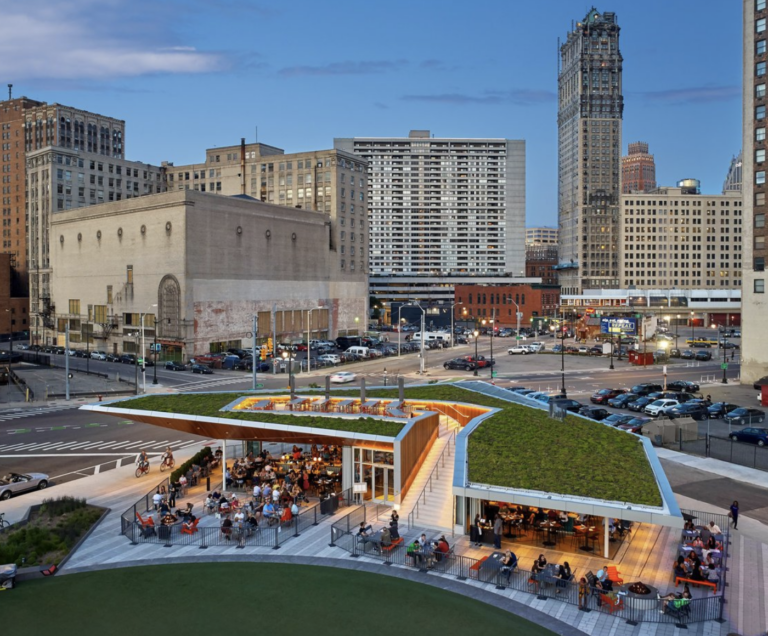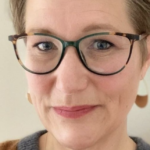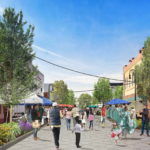
- Kim Kisner
- Business
- 04/09/2025
How livingLAB Approaches Design Through Collaboration

livingLAB is a Detroit-based landscape architecture and ecological planning firm that focuses on sustainable design rooted in place, people, and process. Through a blend of environmental expertise and community engagement, their work spans parks, green infrastructure, community gardens, and other projects with the goal of transforming urban spaces into resilient, inclusive landscapes.
SBN Detroit interviewed with livingLAB’s founder, Courtney Piotrowski, to explore the region-specific challenges and opportunities of working in Southeast Michigan, and how a resident-led approach is redefining its approach to landscape architecture.

Q: What was the impetus behind livingLAB, and how did the concept take shape?
A: livingLAB was born from a desire to offer a more people-centered approach to landscape architecture than what we had experienced in larger, traditional firms. We believe great spaces require the collaboration of many people to build and steward them. By centering community voices and respecting the diverse neighborhoods and environments we work in, we’re able to create more impactful, meaningful spaces. Our work is rooted in community-driven values.
Q: How is the field of landscape architecture evolving in response to climate change and environmental pressures?
A: Sustainability has always been a foundational aspect of landscape architecture – even when early practices were focused primarily on aesthetics. As climate change has become a more urgent concern, we’ve increasingly focused on resilience and on quantifying the impact of our work.
Landscape architects have long planned for dense, walkable communities, green space preservation, and low-impact development. What’s changed is the level of intentionality and the use of technology. We’re now incorporating features like green roofs, water-efficient design, and sustainable materials to reduce environmental harm and promote long-term climate resilience. In many ways, environmental thinking is inherent in our work – it’s just more explicit now.
Q: What are the most pressing ecological or environmental challenges unique to Southeast Michigan that you encounter in your work?
A: Much of our work is within the city of Detroit, where we frequently encounter challenges like industrial air pollution and localized flooding – especially due to more frequent and severe storms linked to climate change.
Industrial activity and truck traffic create not just poor air quality, but excessive noise, and safety concerns. These are not abstract environmental issues – they directly impact residents’ health and quality of life. So, for us, it’s very much about community-centered environmental solutions.
Q: Conversely, what opportunities does Southeast Michigan’s geography and ecosystem present that may not exist in other parts of the country?
A: Southeast Michigan has the tremendous privilege – and responsibility – of being home to the Great Lakes, which contain 20% of the world’s fresh surface water. This region plays a critical role in protecting drinking water, ensuring recreational access, and restoring ecosystems like streams, wetlands, and forests. Our geography is a unique asset, and thoughtful environmental planning here can have an outsized impact.

Q: You describe your work as resident-led. What does that look like in practice? How does that shift the process or outcomes of a project?
A: Every project we take on has a community engagement component. But for us, it’s more than checking a box – we aim for true co-creation. That means understanding the goals, concerns, and lived experiences of the people who will use and be affected by the space. It shifts the outcome significantly. Projects are more likely to be used, embraced, and maintained when they reflect community priorities.
For example, in our master planning work at Patton Park in Southwest Detroit, we held deep engagement sessions across many demographics and age groups. One topic that emerged was the role of public safety – what presence felt welcoming versus intrusive. Those conversations shaped design decisions and ultimately helped the community feel more connected to the changes.
Q: What systemic or policy barriers make sustainable landscape design more difficult to implement at scale in this region?
A: One of the biggest challenges is the fragmentation across regulatory bodies and municipal agencies. For example, the City of Detroit’s Planning Department may have goals that conflict with those of the Water and Sewerage Department. That lack of alignment creates roadblocks during implementation.
Additionally, we often lack dedicated funding for green infrastructure, as well as the capacity to maintain it long-term. These barriers can stall otherwise promising projects.
Q: How are equity and access being addressed—or not addressed—in landscape architecture and green infrastructure planning today?
A: Equity often comes into focus around issues like green stormwater infrastructure. Historically, urban communities have borne the brunt of climate-related issues like flooding or heat islands.

Over the past 13 years, we’ve seen significant strides in bringing equity into the conversation. But that progress is fragile. Much depends on political will and continued investment. We also must rebuild trust with communities that have historically been left out of these processes. The current political climate, with its emphasis on dismantling equity-focused initiatives, presents a real challenge.
Q: If you could implement one major change in how we design and manage land in Southeast Michigan, what would it be – and why?
A: We need to rethink how we address housing and transportation because those two areas are deeply connected to land use, sustainability, and community health.
Expanding access to affordable, climate-resilient housing that is connected to transit would be a game-changer. Smart land use policy must consider both housing equity and climate adaptation if we want to build healthy, inclusive, and economically resilient communities. That’s the secret sauce.
Be sure to subscribe to our newsletter for regular updates on sustainable business practices in and around Detroit.
Kim Kisner
- All
- Business
- Community
- Education
- Events

Unique Monique Scented Candles, a Detroit-based business founded by Monique Bounds., aims to produce candles and household products with clean ingredients and local supply chains. What began as a personal hobby during college has evolved into a full-time venture producing coconut oil and soy-based candles made with essential oils and locally sourced materials. SBN Detroit interviewed Bounds about launching a sustainable product line, sourcing challenges in Michigan, and...

Eastern Market Partnership, in collaboration with the City of Detroit’s Office of Sustainability Urban Agriculture Division, has announced $240,000 in grant funding to support Detroit-based farmers and farmer collectives. The grants will advance food access, climate education, sustainable land use, and economic opportunity, with priority given to Black- and Indigenous-led farms, youth-led initiatives, and projects rooted in historically disinvested neighborhoods. The recipients – ranging from cooperatives and community...

Citizen Robotics is a Detroit-based nonprofit that advances the use of robotics and digital manufacturing in residential construction, focusing on improving productivity, sustainability, and long-term affordability. Best known for its early work in 3D-printed housing, it explores how alternative construction methods and new financial models can reduce material waste, lower lifetime operating costs, and enhance the resilience of homes. SBN Detroit interviewed Tom Woodman, founder and president of...







